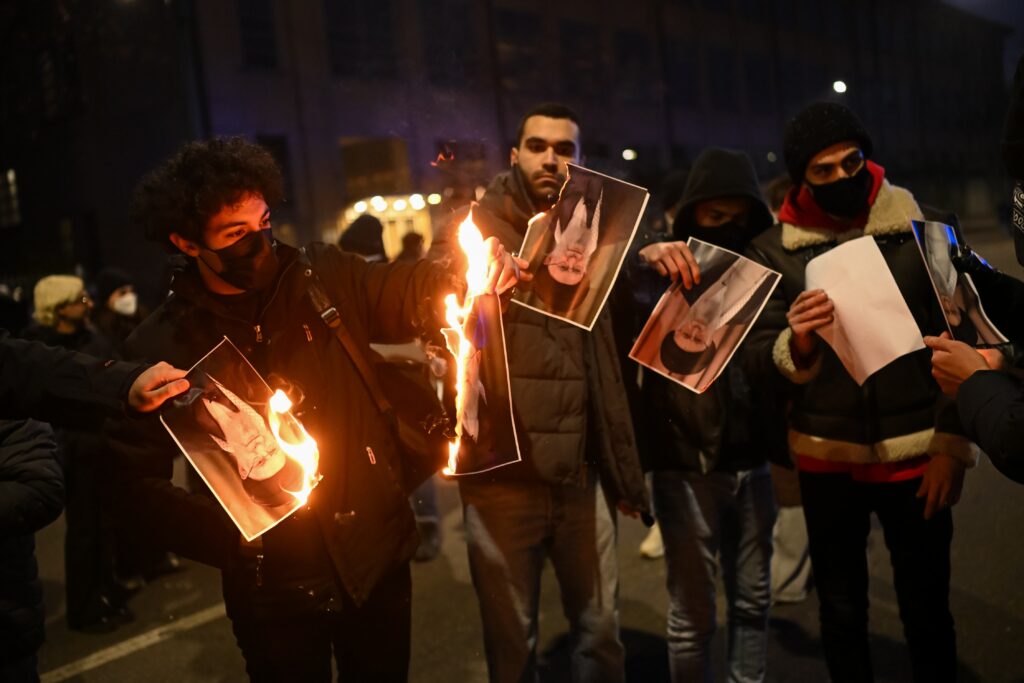UPDATES
Israel’s Political “Big Bang”
May 10, 2012

Update from AIJAC
May 10, 2012
Number 05/12 #03
This Update follows up on Ahron Shapiro’s blog post yesterday on Israeli PM Netanyahu’s shock move on Tuesday night to cancel planned elections and instead form a National Unity government with Opposition Leader Shaul Mofaz.
First up to provide a general perspective on the move is Israeli political scientist Prof. Gerald Steinberg, who argues that the broad political base Netanyahu has created for himself provides a platform to deal with a series of major challenges facing Israel. He stresses the immediate trigger for the move was the court-ordered need to re-write the “Tal Law”, dealing with deferral of military service for Israel’s Ultra-Orthodox minority – which seemed insoluble within the confines of the existing coalition. He further discusses, however, a variety of other challenges this new very large government potentially can tackle – from economic and political reform to negotiation with the Palestinians and above all, the Iranian nuclear question. For Steinberg’s discussion of why the political re-shuffle gives reason for optimism on all these issues ,CLICK HERE. Also seeing the deal as a cause for optimism on several fronts is American foreign policy expert Walter Russell Mead.
Next up, leading Israeli security affairs columnist Ron Ben Yishai devotes a short piece solely to how this political “big bang” in Israel might effects Israel efforts to keep up pressure for a nuclear deal on Iran that it can live with. Ben Yishai argues strongly that this move provides additional credibility for Israeli efforts to threaten to use military force if an acceptable deal is not struck – thus pushing both sides of the negotiations to maximise their attention and efforts. He says the new arrangement does this both by demonstrating the degree of public support that the government has for its stance, and by bringing another highly greatly experienced defence expert, in the form of former Army Chief of Staff and Defence Minister Mofaz, into the inner circle of deliberations on this issue. For the rest of what Ben Yishai has to say, CLICK HERE. Meanwhiole, Jonathan Toben argues that, despite some past statements from Mofaz, there is unlikely to be disunity on Iran in the new Israeli cabinet, and looks at how Netanyahu is already using the new government to attempt to influence European Union foreign policy chief Catherine Ashton . More on Mofaz’s past and current views on Iran here.
Finally, Washington Institute expert David Makovksy offers a more detailed and wider range look at the policy implications of the newly established National Unity government, as well as the politics involved. He has more details on the Tal law and political reform issue-areas, as well as the implications for both potentially igniting talks with the Palestinians, and relations with the US administration. On these last points, Makovksy notes that move may well increase the manoeuvre and thus prospects for progress. For his full analysis on these and other points,
CLICK HERE. Other good analysis of the overall policy effects of the move come from Israeli columnists Amir Mizroch and Evelyn Gordon, former American officials Elliot Abrams and Dov Zackheim, and former Middle East mediator Aaron David Miller.
Readers may also be interested in:
- The Jerusalem Post editorialises on the need to make political reform a key priority of the new government.
- An interesting piece on how the government’s face-off with new Israel Opposition Leader Shelly Yachimovich of Labor is likely to pan out.
- Israeli columnist Shmuel Rosner on the Israeli public reaction to political “big bang”, with some updated information here. Also commenting on this was David Horovitz of the Times of Israel.
- Rosner has some earlier points suggesting different ways to view the political deal here. Some similarly interesting little snippets about the deal also come from Israeli columnist Attila Somfalvi and American journalist Jeffrey Goldberg.
- Goldberg also just published a wicked little satire of US policy on Syria to date.
- Historian Benny Morris writes about the precedent in Israel for broad National unity governments being a prelude to military conflict.
- Some examples from the many stories and comments now appearing at AIJAC’s daily “Fresh AIR” blog:
- Daniel Meyerowitz-Katz on the Australian implications of the recent controversy over apparently openly antisemitic remarks by Norewegian “peace studies” Guru Johan Galtung.
- What Karl Marx can teach us about the history of Jerusalem.
- Why acknowledging the Jewish refugees of the Arab-Israel conflict, as well as the Palestinian ones, may be a key to peace.
- A post on the election of the far-right group “Golden Dawn” into the Greek Parliament.
- A post on French policy on the Iranian nuclear program in the wake of the election of Francois Hollande as France’s new President.
- Allon Lee on the mishandled story found beneath an appalling headline in the Australian on the weekend.
- Sharyn Mittelman on how the London Olympics’ organisers appear determined to maintain a less than inspiring Olympic tradition – that is, a refusal to hold significant official commemorations for the victims of the 1972 Munich Olympic massacre.
Notice: Now Available- “FreshAIR by Email”
AIJAC is now offering an additional new service free of charge. You can now receive our FreshAIR blog, offering news and analysis on a daily basis, as events happens, by email. This is in addition to the Facebook, Twitter and RSS access already available. To get “FreshAIR by email”, simply send an email to FreshAIR-subscribe@aijac.org.au and reply to the confirmation email you will receive. (You can unsubscribe anytime by simply emailing FreshAIR-unsubscribe@aijac.org.au). Or just visit our sign-up webpage here.
Netanyahu’s ‘big bang’: A preliminary analysis
Gerald M. Steinberg
Times of Israel, May 8, 2012, 12:25 pm
Israel may finally have gotten the political “big bang” that voters thought they were getting during the elections three years ago. The agreement bringing the centrist and pragmatic Kadima party into a wider government coalition, under Netanyahu’s leadership, creates the stable and broad political base necessary for tackling Israel’s major challenges. The ideological fringes and interest groups on all sides are isolated, and their artificial political power, resulting from the ability to bring down narrow coalitions, has been deflated.
While a totally fresh start in the complex Israeli political system is unrealistic, the new coalition, based on a wide Zionist consensus, provides unprecedented opportunities for addressing and perhaps even fixing many of the dysfunctional components. The agenda items for this new government provide more than enough urgent issues to fill the 18 months until elections must be held. Even prioritizing them will not be easy. And governing with a coalition of 94 Knesset members (more that three-quarters of the total) has some significant limitations.
The immediate trigger that almost brought down the current coalition was the urgency of replacing the “Tal Law” that granted exemptions from military service to the ultra-Orthodox sector and was struck down in the courts. More broadly, relations between this narrow group and the wider population, the unjustified economic subsidies they receive, and the exaggerated political role of the rabbinical leadership, will now be open for a long overdue correction.
Wider economic reform is another immediate issue, particularly the need to reverse the huge divide between Israel’s richest one-percent and the poorer and usually-underpaid general population. The Jewish principles of social justice had become empty slogans, and last summer’s student-led protests rightfully demanded affordable housing, improvements in public transportation and the break-up of monopolies that raised prices with impunity. With less dependence on wealthy political donors, the “big bang” government can address these issues and repair the badly frayed social contract.
The longer-term social and economic impacts of this broad coalition extend, potentially, beyond the next year and a half, and reopen the door to long-overdue changes in outmoded governance processes and structures. Such basic constitutional changes, which can only be adopted by a wide consensus, are necessary to prevent a return to the old system in which small factions and fringe groups maneuvered between the major parties.
On the complex issues of borders, settlements and negotiations with the Palestinians, the new government can belatedly confront the violent fringe that has sought to impose its views. The pragmatic consensus that supports a stable peace, if possible, and recognizes the costs to Israel of unending occupation and responsibility for millions of Palestinian Arabs, can reassert its voice.
This does not mean a return to the vulnerability of the 1949 cease-fire lines, or destruction of communities built in good faith across that “green line.” But now, the government has the credibility to pursue negotiations for a two-state framework based on compromise. If Israelis see a basis for stable agreement, including an end to invented Palestinian histories and efforts to flood Israel with millions of third-generation “refugees,” the majority will accept the costs. And if such negotiations reach another dead end, a broad-based Israeli government can move toward implementing the consensus approach to borders and leave the Palestinians to decide how to govern themselves.
A broad unity government anchored by Likud and Kadima — the two largest Israeli parties — will also have the legitimacy and stability to deal carefully and seriously with the wider regional challenges. If Iran continues to move toward nuclear weapons, all options are still on the table, and do not need to be spelled out again. The presence of three former IDF chiefs of Staff in this government is, in itself, a form of deterrence, (although on many issues, the narrow military backgrounds of party leaders are not always assets). In addition, given the unprecedented and unpredictable changes in Egypt and Syria, Israel presents an image of stability and democratic strength. New Egyptian leaders who might seek to divert public attention from economic and other issues by renouncing the peace treaty with Israel might now have second thoughts regarding the potential response.
For Israel’s Arab citizens and other minorities, a more stable and coherent Israeli leadership can reduce the impact of extremists and separatist groups, and strengthen the options for equal opportunity. The Israeli Jewish majority has shown that it remains united on core identity issues, but, as in the case of European, Islamic and other nation-states characterized by a dominant culture, minority rights need to be safeguarded.
Finally, the fact that this political maneuver took most Israeli pundits by surprise demonstrates the degree to which Netanyahu’s strategic and political skills are underestimated and misrepresented. Ideological and personal factors have blinded analysts and foreign political leaders, including heads of state, to the caution and deliberation with which Netanyahu has governed in the past three years. There are also important lessons to be learned from this dimension.
Overall, the consensus-based governing coalition is the right move at the right time. But despite having come close to the long-overdue “big bang” before, only to be disappointed by the fizzle, the renewed optimism is justified.
Gerald Steinberg is professor of political science at Bar Ilan University and president of NGO Monitor.
Back to Top
————————————————————————
Netanyahu boosts Israel’s deterrence
Analysis: New unity government reinforces Israeli deterrence ahead of possible strike in Iran
Ron Ben Yishai
Ynet.com, 05.08.12, 12:42
The unity deal worked out secretly by Prime Minister Benjamin Netanyahu and Kadima Chairman Shaul Mofaz boosts our deterrence power on the Iranian front and Israel’s ability to press the five permanent members of the Security Council and Germany not to compromise too much.
The new unity government will attest to very broad support for the Netanyahu government, while the prime minister’s and defense minister’s position on Iran’s nuclear program is widely known.
This fact was certainly not lost on the US Administration and European governments, which are very anxious about potential Israel moves that may hinder their economic recovery. After all, an Israeli strike in Iran could prompt oil prices, which are currently going down, to skyrocket.
On the domestic front, the decision to form a unity government has even greater value. First, the official forum of decision-makers on Iran – that is, the security cabinet – has been reinforced with another official who possesses great defense experience. Shaul Mofaz has served as defense minister and IDF chief of staff in the past, and recent conversations with him indicate that he will not rush to pull the trigger
Mofaz will be joining the forum of top eight government ministers, which will now turn into a forum of nine entrusted with taking informal decisions on critical security and diplomatic issues; this also includes the decision on whether to strike in Iran. What we have here is another experienced hand, which will improve the decision-making process on the defense front.
Should a decision to strike Iran be taken, the existence of a unity government will reduce the danger of criticism should the operation fail or lead to unexpected results.
In the final analysis, we can assert that the formation of the new government – assuming it will function properly and survive the crises expected in the coming months – boosts Israel’s deterrent power and upgrades its leadership’s decision-making ability on the security and diplomatic front, topped by the Iran issue.
However, we must keep in mind that the Ulpana affair and mostly the issue of drafting the haredim into the IDF have not yet been resolved. Only once the government proves that it can contend with this issues, it will also enjoy greater credibility and deterrent power on the security front.
Back to Top
————————————————————————
Changes in Israeli Policy after the Netanyahu-Mofaz Deal
David Makovsky
Policy Watch, May 9, 2012
Israel’s new national unity government strengthens both Binyamin Netanyahu and Shaul Mofaz, but it will ultimately be judged by whether it makes progress on its foreign and domestic policy agenda.
In a stunning political shift, Israeli prime minister Binyamin Netanyahu and Shaul Mofaz, the newly elected head of the leading opposition party Kadima, forged a national unity government in Israel late Monday night. The move adds 28 Kadima parliamentarians to the ruling coalition, increasing the current government’s tally to 94 of the Knesset’s 120 seats, the most ever. Mofaz will become vice prime minister, a member of the inner security cabinet, and a minister-without-portfolio. Various portfolios will be given to other Kadima members. The move was announced mere hours after the preliminary passage of a bill calling for early elections on September 4. The parties have now pushed those elections to October 2013, the end of the full four-and-a-half-year term — a longevity few Israeli governments have achieved.
In a joint press conference on Tuesday, Netanyahu and Mofaz announced that the new government’s focus will be fourfold: drafting new legislation to replace the Tal Law, a controversial measure that exempts the ultraorthodox (Haredim) from military service and is due to expire in August; proposing changes to the electoral system in time for the next election; passing a new state budget; and advancing what Netanyahu dubbed a “responsible” peace process with the Palestinians. Any preliminary analysis of these developments must look at both the political and policy motivations.
POLITICAL IMPACT: MARRIAGE OF CONVENIENCE
On a purely political level, the deal was clearly done to strengthen both Netanyahu and Mofaz. Under its terms, the very risk-averse Netanyahu will likely remain in power for another year-and-a-half before facing a vote. And while he has not said so publicly, he is acutely aware that his previous coalition’s dependence on right-wing parties hurt both his and Israel’s image. He is also mindful of the fact that unity governments tend to be popular domestically.
The deal offers an opportunity for a center-right alliance (and greater independence and maneuverability for Netanyahu) that was unlikely to present itself after early elections. Although polls had put the prime minister safely ahead of Kadima before the announcement, he has long viewed Mofaz as a formidable opponent who could eat away at the Likud Party’s Sephardic populist base. As a Sephardic former chief of staff who has championed economic populism, Mofaz casts an image of political moderation that poses a threat to Netanyahu, who prefers to bring him inside the tent. The prime minister also hopes that a unity government will allow him to openly absorb at least some of Kadima’s more hawkish members after the next election, since the party originated in 2005 as a breakaway from Likud, which opposed Ariel Sharon’s Gaza disengagement at the time.
For Mofaz, the deal gives him and Kadima a new lease on life. Having just replaced Tzipi Livni at the party’s helm, he was ill prepared for September voting. He will now have time to rebuild Kadima, which polls had been predicting would only receive 11 seats in fall elections, compared to the 28 it holds today.
Meanwhile, the Labor Party is betting that the new coalition will dissipate without any substantive accomplishments, intensifying public cynicism toward the two leaders who just recently were hurling invectives against each other. An early poll taken immediately after the decision indicates that the public is skeptical. Labor leader Shelly Yachimovich also hopes that a summer revival of the social protest movement will again bring hundreds of thousands to the streets expressing dissatisfaction. Ironically, organizers of that movement have admitted that electoral reform is a prerequisite for the societal changes they seek.
DOMESTIC ISRAELI ISSUES
The most immediate impact of the deal will likely be decreased influence by the ultraorthodox Haredim. Netanyahu apparently realized that his previous coalition would not survive a rewrite of the Tal Law. The new coalition’s configuration means that three secular parties — Likud, Kadima, and Yisrael Beitenu — will now have 70 of the 94 coalition seats. Yet the Likud Central Committee has many religious (albeit not Haredi) members, and the party garners many religious votes. Despite its differences with the Haredim, Likud may press for a more gradualist focus on civilian national service programs that could mitigate the shock to the ultraorthodox community.
Netanyahu and Mofaz’s public commitment to changing the electoral system is tantalizing given the disproportionate influence that the existing proportional representation system has afforded the Haredim and ultranationalists. Some critics argue that until the system is changed, any Israeli advances toward peace will be stymied by an opposed minority. Yet Likud may be fearful of any change that is not incremental, as it does not wish to alienate the small parties — largely religious, but not exclusively so — that have been part of its coalition governments since its first electoral victory in 1977.
IRAN
In terms of policy motivations for the deal, Iran seems to be key. The issue was conspicuously absent from Netanyahu’s press conference. For his part, Mofaz has publicly suggested that he does not favor a unilateral Israeli attack at the moment. Of course, he also said — as recently as last week — that he would definitely not join the government and was determined to bring Netanyahu down. Mofaz led the previous Israeli government’s dialogue with the United States regarding Iran and often publicly hinted that an Israeli strike was an option that could not be discounted.
Whatever the case, the deal means that there will be no early elections to distract Netanyahu from the Iran issue. One can expect him to carefully monitor the multilateral talks involving the United States and Iran in the coming weeks. Nobody knows whether a nuclear deal will be reached in the short term given the looming European embargo of Iranian oil, but Netanyahu will want to know that Israel’s interests are protected even if it is not at the table.
The new coalition is certainly welcome news to Defense Minister Ehud Barak, who — along with Netanyahu — has been the leading advocate of an Israeli strike. Barak will now retain his position until the 2013 elections. Given the defense minister’s vanishing political base, Netanyahu would have come under party and other pressures to replace his close ally in the aftermath of early elections. Retaining Barak gives the prime minister more time to calculate whether and when an Israeli strike will occur.
More broadly, a national unity government that includes three former military chiefs of staff will have an easier time galvanizing public support for any course of action or inaction that Netanyahu chooses. Those who believe Israel will strike compare the Mofaz deal to Prime Minister Levi Eshkol bringing in Menachem Begin and his opposition party on the eve of the 1967 war.
PALESTINIANS
Kadima will now be able to lobby against West Bank settlement expansion from within, for instance, advocating that construction be limited to existing settlement blocs largely adjacent to the pre-1967 boundaries where most of the settlers actually live. In theory, Kadima’s inclusion could give Netanyahu the political cover he needs to uphold the Israeli Supreme Court’s ruling that a particular unauthorized outpost be evacuated this summer. Yet even the 2006-2009 Kadima-led government avoided dismantling such outposts, fearing that it would drain political capital needed for the larger task of peacemaking with the Palestinians. Moreover, leading peace process critic Avigdor Liberman will remain as foreign minister, though his relative weight in the cabinet and his leverage over Netanyahu on the peace issue may be diminished by the fact that his party (Yisrael Beitenu) is not the most senior coalition partner.
Generally speaking, Kadima’s inclusion means better prospects for peacemaking than in the past, giving Netanyahu more room to maneuver on the issue than before. Israel may now be more inclined to make bilateral gestures when it comes to the state-building efforts favored by Palestinian prime minister Salam Fayad, or to try other quiet overtures. To the extent Washington’s involvement is at issue, however, the political window for such action between U.S. and Israeli elections will be narrow. Even if President Obama is reelected, this window will not open until November, and if he loses, the window narrows even further, given that a new president would not be inaugurated until January and would need time to organize a new cabinet.
U.S.-ISRAELI RELATIONS
Although the U.S. government will presumably not comment on the domestic affairs of another government, it clearly prefers Israeli coalitions that are not dependent on right-wing parties who favor settlement expansion. Historically, Washington has viewed Israeli opposition parties as pressure points for dealing with prickly Israeli leaders. Despite the president’s sometimes-rocky relationship with Netanyahu, the Obama administration has avoided playing this card. In any case, the new unity government eliminates this option, especially since key Kadima members have long blamed U.S. standoffishness for contributing to the party’s decline.
CONCLUSION
Israel’s new coalition is a marriage of convenience for Netanyahu and Mofaz. If it yields genuine legislative achievements, it will be seen as inspired and politically savvy. But if it serves as a fig leaf for inaction, it will validate Yachimovich’s accusation that it is nothing more than a cynical ploy for political survival.
David Makovsky is the Ziegler distinguished fellow and director of the Project on the Middle East Peace Process at The Washington Institute.
Tags: Israel





